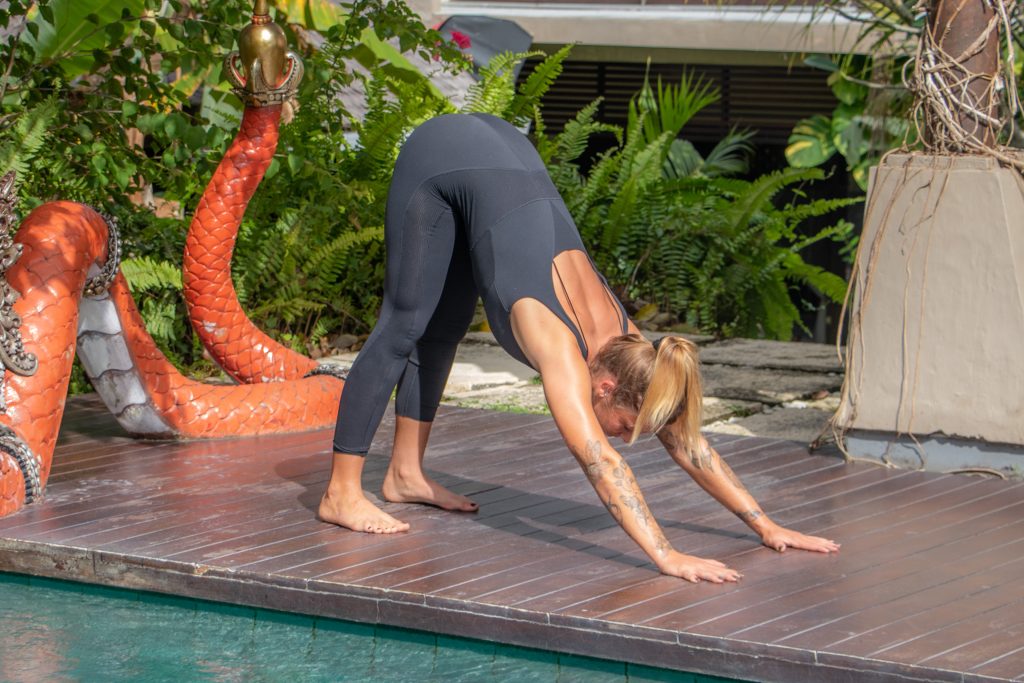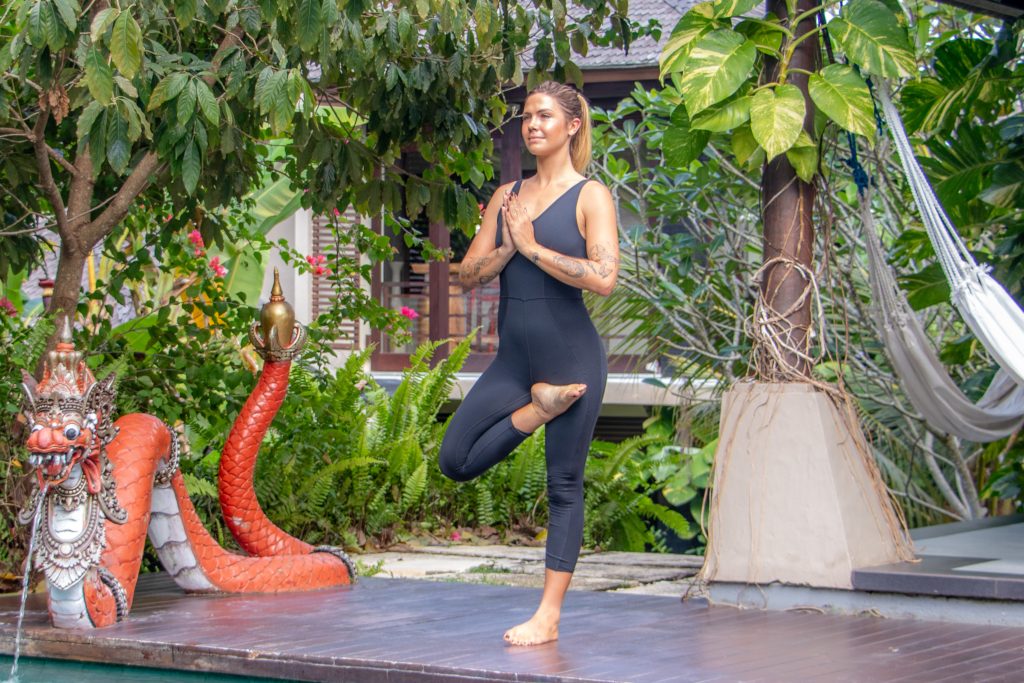The Mental Health Benefits of Yoga
Mental health has emerged as a crucial aspect of overall well-being.
Yet, mental health is often overlooked or misunderstood.
Just as you exercise to keep your body fit and healthy, it’s equally important to nurture your mind.
Yoga has emerged as a holistic way to enhance mental health.
But yoga is not just about physical postures. It’s a mind-body discipline that integrates physical poses, controlled breathing, and meditation to foster mental calmness and clarity.
The benefits of yoga extend beyond the mat, influencing various aspects of our lives. It helps us manage stress, anxiety, and depression, promoting a sense of inner peace and balance.
Yoga enhances our ability to focus, boosts self-awareness, and fosters a positive outlook, which are all key components of mental health.
In this comprehensive guide, we will delve into the profound connection between yoga and mental health, exploring how this age-old practice can help us navigate the challenges of modern life and achieve mental wellness.
Now, let’s embark on this enlightening journey together.

The Science Behind Yoga and Mental Health
Yoga has been gaining recognition in the scientific community for its potential benefits on mental health.
The science behind yoga and its impact on mental health is increasingly being studied and understood, revealing fascinating insights into the mind-body connection.
How Yoga Affects the Brain
Yoga is a holistic practice that integrates physical postures, controlled breathing, and meditation.
Regular practice of yoga promotes strength, endurance, and flexibility, and cultivates a sense of calmness and well-being.
This is achieved by producing a physiological state opposite to that of the flight-or-fight stress response, creating a sense of balance and union between the mind and body.
Yoga is a form of mind-body fitness that involves a combination of muscular activity and an internally directed mindful focus on awareness of the self, the breath, and energy.
This mindful focus has a calming and restorative effect, lowering breathing and heart rates, decreasing blood pressure, lowering cortisol levels, and increasing blood flow to the intestines and vital organs.
Scientific Studies on Yoga and Mental Health
Scientific studies have explored the therapeutic effects of yoga on mental health.
One comprehensive review of selected articles regarding the therapeutic effects of yoga found that yogic practices enhance muscular strength and body flexibility, promote and improve respiratory and cardiovascular function, reduce stress, anxiety, depression, and chronic pain, improve sleep patterns, and enhance overall well-being and quality of life.
Another study found that yoga encourages one to relax, slow the breath, and focus on the present, shifting the balance from the sympathetic nervous system and the flight-or-fight response to the parasympathetic system and the relaxation response.
The shift is calming and restorative, lowers breathing and heart rate, decreases blood pressure, lowers cortisol levels, and increases blood flow to the intestines and vital organs.
Yoga has also been found to increase self-awareness and self-control, improve mood, and reduce symptoms of mental health disorders like depression and anxiety.
Regular practice of yoga can lead to significant increases in serotonin levels, a key hormone that stabilizes our mood, feelings of well-being, and happiness.
Ultimately, the science behind yoga and its benefits for mental health is compelling. By integrating the mind and body, yoga offers a holistic approach to mental health that goes beyond traditional treatments.
As we continue to explore and understand the science of yoga, it’s clear that this ancient practice holds great promise for our mental well-being.
Exploring Yoga Styles for Mental Wellbeing
Yoga, a practice steeped in ancient wisdom, offers a diverse range of styles, each with its unique benefits for mental health.
Whether you’re seeking stress relief, improved focus, or emotional balance, there’s a yoga style that can cater to your needs.
Let’s delve into some of the most popular yoga styles and how they contribute to mental well-being.
- Hatha Yoga: Often considered the foundation of all yoga styles, Hatha Yoga involves slow and gentle movements, making it an excellent choice for beginners. It focuses on basic postures and breathing exercises, promoting mindfulness and relaxation. Regular practice can help reduce stress and anxiety, enhancing mental tranquility.
- Vinyasa Yoga: Known for its fluid, movement-intensive practice, Vinyasa Yoga synchronizes breath with motion. This style can be quite dynamic, providing a mental focus that helps distract from daily stressors. It’s a great way to improve mental clarity and reduce anxiety.
- Ashtanga Yoga: Ashtanga is a rigorous and structured yoga style that involves a specific sequence of postures. It requires focus and discipline, making it a powerful tool for building mental strength and resilience. Regular practice can help manage stress, improve mood, and enhance self-awareness.
- Yin Yoga: Yin Yoga is a slow-paced style where poses are held for longer periods, typically from 1 to 5 minutes. This encourages deeper relaxation and mindfulness, making it an excellent practice for stress relief and emotional balance. It’s a perfect style for those looking to quiet the mind and cultivate inner peace.
- Restorative Yoga: As the name suggests, Restorative Yoga aims to restore balance and rejuvenate the mind and body. It involves the use of props to fully support the body in poses, allowing for complete relaxation. This style is particularly beneficial for mental health, as it promotes deep relaxation, reduces stress, and fosters a sense of well-being.
- Kundalini Yoga: Kundalini Yoga is a blend of spiritual and physical practices. It combines dynamic breathing, meditation, chanting, and physical poses to awaken the energy at the base of the spine. This style is known to enhance self-awareness, improve mood, and reduce symptoms of mental health disorders like depression and anxiety.
Remember, the best yoga style is the one that resonates with you and meets your mental health needs.
Experiment with different styles and find the one that brings you peace, balance, and mental clarity.
Yoga Poses to Boost Your Mental Health
Yoga, a practice that harmonizes the mind, body, and spirit, offers a wealth of benefits for mental health.
Certain yoga poses, or asanas, are particularly effective in reducing stress, and anxiety, and promoting a sense of calm and well-being.
Here, we delve into some of these poses and provide a step-by-step guide on how to perform them.
Child’s Pose (Balasana)
This restorative pose helps to calm the mind and relieve tension in the body.

- Start by kneeling on your mat, with your big toes touching each other.
- Spread your knees hip-width apart and sit back on your heels.
- Lean forward, extending your arms in front of you, and rest your forehead on the mat.
- Breathe deeply and hold the pose for up to 5 minutes.
Downward-Facing Dog (Adho Mukha Svanasana)
This pose helps to energize the body and calm the mind, relieving stress and mild depression.

- Start on your hands and knees, with your wrists directly under your shoulders and your knees under your hips.
- Tuck your toes under and lift your hips, straightening your legs as much as possible.
- Press your palms into the mat and rotate your inner elbows towards each other.
- Hold for up to 1 minute, then bend your knees and rest in Child’s Pose.
Tree Pose (Vrksasana)
This balancing pose helps to improve focus and concentration, promoting mental clarity.

- Stand tall and place your right foot on your left inner thigh, above or below the knee.
- Bring your hands together in a prayer position at your heart center.
- Focus on a point in front of you and hold the pose for up to 1 minute.
- Repeat on the other side.
Warrior II (Virabhadrasana II)
This powerful pose helps to build confidence and self-esteem.

- Stand with your feet wide apart, about the length of one of your legs.
- Turn your right foot out 90 degrees and your left foot in slightly.
- Raise your arms to shoulder height, parallel to the floor, palms facing down.
- Bend your right knee to a 90-degree angle, keeping your knee over your ankle.
- Look over your right hand and hold it for up to 1 minute.
- Repeat on the other side.
Corpse Pose (Savasana)
This pose promotes deep relaxation and is often used at the end of a yoga session to help seal in the benefits of the practice.

- Lie flat on your back with your arms at your sides, palms facing up.
- Allow your feet to fall open naturally and close your eyes.
- Breathe deeply and allow your body to relax completely.
- Stay in this pose for 5-10 minutes.
Remember, it’s essential to listen to your body when practicing yoga. These poses can be modified to suit your comfort level, and it’s always a good idea to learn new poses under the guidance of a certified yoga instructor.
With regular practice, these yoga poses can help to enhance your mental health and overall well-being.
Conclusion
It’s clear that yoga offers a wealth of benefits for mental health.
From enhancing self-awareness and promoting relaxation to reducing stress and anxiety, yoga serves as a powerful tool in our mental wellness toolkit.
We’ve explored the science behind yoga and its impact on the brain, delved into different yoga styles and their unique benefits, and even walked through specific yoga poses that can boost your mental well-being.
Each element of yoga, be it the physical postures, controlled breathing, or the meditative aspect, contributes to a healthier, more balanced mind.
But remember, yoga is more than just a practice—it’s a journey. A journey of self-discovery, finding balance, and cultivating inner peace. It’s a journey that requires patience, commitment, and self-love.
Every step you take on this path brings you closer to mental well-being. So, why wait? Roll out your yoga mat and embrace the transformative power of yoga.
Start small, perhaps with a few minutes of practice each day, and gradually build up.
Listen to your body, honor your pace, and most importantly, enjoy the process.
Your mind will thank you.
Namaste.
